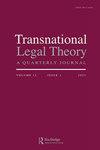The potential and limits of peoples’ tribunals as legal actors: revisiting the Tokyo Women’s Tribunal
Q2 Social Sciences
引用次数: 1
Abstract
Abstract From 8 to 12 December 2000, the Tokyo Women’s Tribunal (‘TWT’) convened to address the sexual enslavement of ‘comfort women’ during the Second World War. As a peoples’ tribunal organised by private citizens, the TWT’s findings are not legally binding or enforceable. Nevertheless, the tribunal’s judgment has been referenced and discussed in numerous official legal spaces. This article argues that the TWT’s conventional approach to law enhanced its legal legitimacy and facilitated its penetration into formal legal spheres. The Tribunal’s legal strategy came with certain limitations. While its proceedings and judgment strove to engage with survivors’ experiences and claims in a holistic manner, the tribunal’s ability to do so was limited by its commitment to positive law and formal procedure. Drawing on transitional and restorative justice scholarship, this article explores the extent to which the TWT addressed survivors’ relational, participatory, and transformative claims.人民法庭作为法律行动者的潜力和局限性:重新审视东京妇女法庭
摘要2000年12月8日至12日,东京妇女法庭召开会议,处理第二次世界大战期间对“慰安妇”的性奴役问题。作为一个由普通公民组织的人民法庭,TWT的调查结果不具有法律约束力或可执行性。尽管如此,法庭的判决已在许多官方法律空间中被提及和讨论。本文认为,TWT的传统法律方法增强了其法律合法性,并促进了其向正式法律领域的渗透。法庭的法律战略有一定的局限性。虽然法庭的诉讼程序和判决努力以全面的方式处理幸存者的经历和索赔,但法庭这样做的能力受到其对积极法律和正式程序的承诺的限制。本文借鉴过渡时期和恢复性司法学术,探讨了TWT在多大程度上解决了幸存者的关系性、参与性和变革性诉求。
本文章由计算机程序翻译,如有差异,请以英文原文为准。
求助全文
约1分钟内获得全文
求助全文
来源期刊

Transnational Legal Theory
Social Sciences-Law
CiteScore
2.10
自引率
0.00%
发文量
7
期刊介绍:
The objective of Transnational Legal Theory is to publish high-quality theoretical scholarship that addresses transnational dimensions of law and legal dimensions of transnational fields and activity. Central to Transnational Legal Theory''s mandate is publication of work that explores whether and how transnational contexts, forces and ideations affect debates within existing traditions or schools of legal thought. Similarly, the journal aspires to encourage scholars debating general theories about law to consider the relevance of transnational contexts and dimensions for their work. With respect to particular jurisprudence, the journal welcomes not only submissions that involve theoretical explorations of fields commonly constructed as transnational in nature (such as commercial law, maritime law, or cyberlaw) but also explorations of transnational aspects of fields less commonly understood in this way (for example, criminal law, family law, company law, tort law, evidence law, and so on). Submissions of work exploring process-oriented approaches to law as transnational (from transjurisdictional litigation to delocalized arbitration to multi-level governance) are also encouraged. Equally central to Transnational Legal Theory''s mandate is theoretical work that explores fresh (or revived) understandings of international law and comparative law ''beyond the state'' (and the interstate). The journal has a special interest in submissions that explore the interfaces, intersections, and mutual embeddedness of public international law, private international law, and comparative law, notably in terms of whether such inter-relationships are reshaping these sub-disciplines in directions that are, in important respects, transnational in nature.
 求助内容:
求助内容: 应助结果提醒方式:
应助结果提醒方式:


